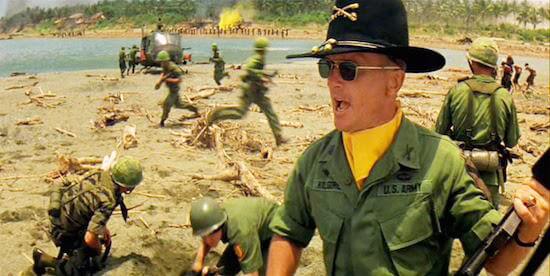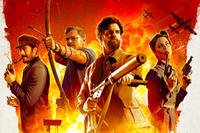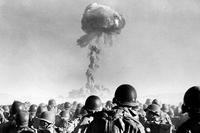
For over 80 years, military films have made an impact at the Academy Awards. With American Sniper scoring six nominations at this year’s Oscars, including Best Picture, Best Adapted Screenplay and Best Actor, we thought it would be a good time to do our rundown of the top dozen military movies in Oscar history (in our humble opinion – feel free to mention some of your favorites in the comments section below this article)… And if you want more details on American Sniper, check out the full Military.com review as well as a feature on Chris Kyle and this video footage.
Note: This list only features films that have won an Oscar. There are certainly many classic Oscar-less films out there that would make our list of best military movies ever (Das Boot, for one).
12. From Here to Eternity (1953)
%embed1%
From today’s perspective, From Here to Eternity is a melodramatic piece of work. The plot deals with blackmail, adultery, doomed romance and murder among Army soldiers on Oahu just prior to the attack on Pearl Harbor, which doesn’t present our troops in the most flattering light. But ’50s audiences ate up the story, when they weren’t swooning over the sight of Burt Lancaster and Deborah Kerr locking lips while getting caught up in that Pacific surf. Director Fred Zinnemann does the best he can with the soap-opera twists and turns, and fortunately he has actors like Lancaster, Montgomery Clift and Frank Sinatra (in a star-making turn as hotheaded Private Maggio) to lean on. The film cleaned up at the Oscars, scoring eight awards, including Best Picture, Best Director, Best Supporting Actor (Sinatra) and Supporting Actress (Donna Reed).
11. Wings (1927)
%embed2%
Wings has the distinction of being the very first picture to win an Academy Award for Best Picture (in 1929), as well as the only silent film to ever do so. At heart a basic story about two small-town rivals who join the Air Service in World War I, the film mixes bittersweet romance and gargantuan scenes of air and ground combat -- the production used hundreds of extras and over 300 pilots, including pilots and planes of the United States Army Air Corps. The movie’s climactic Battle of Saint-Mihiel utilized 3500 infantrymen on a battlefield made specifically for the production. In addition to the Best Picture award, the film also received a well-deserved award for Best Engineering Effects. Wings’ longevity has never been questioned -- it was recently given a four-star restoration on DVD.
10. Patton (1970)
%embed3%
Bolstered by George C. Scott’s performance as irascible general George S. Patton, Patton paints an interestingly ambivalent portrait of a commander who was smart and tough enough to defeat Germany’s best generals in World War II, but too blunt and temperamental to ever win favor with his superiors in the Allied forces. Scripted by Francis Ford Coppola, the film follows Patton from North Africa to Sicily to the final defeat of Nazi Germany, and in the process gives us some memorable combat scenes, including a confrontation between Patton and German Field Marshal Erwin “the Desert Fox” Rommel, capped off with the immortal line, “Rommel, you magnificent bastard – I read your book!” The idiosyncratic Scott refused to accept an Oscar nomination but won for Best Actor anyway; the film didn’t make out too badly either, garnering six Oscars, including Best Picture, Best Director and Best Original Screenplay.
9. All Quiet on the Western Front (1930)
%embed4%
If you ever needed a reminder that “war is hell,” look no further than this film, which might not be well-known with today’s audiences but remains a shocking, hard-hitting look at the experiences of normal troops in the battlefield. Following the mostly declining fortunes of a group of young German soldiers during World War I, the movie was so effective as an anti-war statement that Adolf Hitler and the Nazi Party banned the film from Germany in the 1930s and early 1940s. Many movies have touched on the futility of war, but few have done so as bleakly as All Quiet on the Western Front, which earned Academy Awards for Outstanding Production and Best Director.
8. Saving Private Ryan (1998)
%embed5%
Saving Private Ryan is a standard “men on a mission” film in many respects, but while it might be conservative in its story and its sentiments, Steven Spielberg’s World War II opus demonstrates top-line technical proficiency in filmmaking and depictions of combat, as well as skilled acting all around by stalwarts like Tom Hanks and Matt Damon. The opening 20 minutes, which chronicles the Omaha Beach landings during D-Day, cost $12 million alone to film, and included 1,500 extras. The scene still ranks as one of the most realistic, brutal and gritty combat scenes in movie history, and Janusz Kamiński’s jittery, monochromatic cinematography set a palette that countless war movies have followed since. At the Academy Awards, Saving Private Ryan scored five Oscars, including Best Cinematography, Best Director, Best Sound Effects Editing, Best Film Editing and Best Sound Mixing.
7. The Hurt Locker (2009)
%embed6%
Kathryn Bigelow’s The Hurt Locker did for the Iraq War what Oliver Stone’s Platoon did for Vietnam two decades before: give audiences a down-and-dirty look at what it was like to be in the middle of the conflict. Based on the wartime experiences of journalist Mark Boal, the film follows an Army Explosive Ordnance Disposal team around Baghdad as it goes about its job of defusing IEDs. Stuffed with suspenseful scenes, The Hurt Locker is an intense ride, with Jeremy Renner giving a memorable performance as the team’s lead specialist, perched between confidence and insanity. While there is no doubt about The Hurt Locker’s effectiveness as a thrilling action movie, some have taken it to task for some of its inaccuracies (here’s just a few of them). Still, when all was said and done, the film cleaned up at the Oscars, getting awards for Best Picture, Best Director, Best Original Screenplay, Best Sound Editing, Best Sound Mixing, and Best Film Editing. Bigelow also made history by becoming the first woman director to win an Oscar.
6. Platoon (1985)
%embed7%
At the time of Platoon’s release, other major movies had already been made about Vietnam, including Apocalypse Now and The Deer Hunter, but Oliver Stone’s film was the first to realistically depict the chaos and intensity of being a grunt in the thick of it during the war. A simple tale of a wide-eyed recruit (Charlie Sheen) losing his innocence, the film established Stone as a cinematic force, and is informed by (and benefits from) Stone’s own experiences as a soldier in Vietnam. Although Stone struggled to find a producer for the film (at the time, most figured that no one would want to see another Vietnam movie), he was vindicated as it won seven Oscars, including Best Picture and Best Director.
5. The Best Years of Our Lives (1947)
%embed8%
Unlike most military movies, The Best Years of Our Lives focuses on the tough transition back to civilian life after wartime. The movie begins at the end of World War II, with three veterans heading home to be with their families and loved ones, and over the next few hours, we witness the struggles of these ordinary Joes as they attempt to fit back in with communities and families that have changed during their absence. Humanely directed by William Wyler and boldly addressing the everyday struggles and frustrations of wounded warriors and restless veterans, the film stands up today as a great drama, and received nine Oscars, including Best Picture, Best Director, Best Actor (Fredric March), Best Supporting Actor (Harold Russell), Best Film Editing, Best Adapted Screenplay, and Best Original Score.
4. Lawrence of Arabia (1962)
%embed9%
Few have ever directed a movie with the epic sweep of David Lean, and no Lean movie is as epic as Lawrence of Arabia, which won seven Oscars, including Best Director, Best Sound Editing, Best Film Editing, and Best Picture. Set on the Arabian Peninsula during the First World War, the story follows unorthodox British Colonel T.E. Lawrence, who helps the Arabs in their fight against the Turks, and ends up losing his soul as he gets swept up in the continent’s tribal conflicts. Anchored by Peter O’Toole’s star-making performance as Lawrence and Omar Sharif’s memorable turn as his Arabian comrade, Lawrence of Arabia is nearly four hours long, lushly photographed, and teeming with panoramic battle scenes. They don’t make ’em like this any more.
3. The Deer Hunter (1978)
%embed10%
Utter the words “Russian roulette,” and many folks will think of Michael Cimino’s The Deer Hunter, the haunting drama about working-class buddies from Pennsylvania who are emotionally and physically scarred by Vietnam. While most will remember the deadly game of Russian roulette the Vietcong force the American POWs to play, less time is spent on the war itself than on the psychological and emotional devastation it inflicts on the film’s lead characters. Working with a stellar cast that included Robert DeNiro, Christopher Walken and Meryl Streep, Cimino created an elegiac, downbeat movie that was more about the death of the American Dream than about the authenticity of military life (it’s been pointed out that there has never been any proof that the Vietcong played “Russian roulette” with their captives). At the Academy Awards, The Deer Hunter won Best Picture, Best Director, Best Supporting Actor (Christopher Walken), Best Film Editing, and Best Sound.
2. The Bridge on the River Kwai (1957)
%embed11%
Winner of seven Oscars, including Best Picture, Best Director (David Lean) and Best Actor (Alec Guinness), The Bridge on the River Kwai occupies a place on many critics’ “best film of the century” lists. Set during World War II, most of the film’s action focuses on the building of a Japanese railway in Thailand by Allied POWs, and a plan by an Allied special unit to sabotage the bridge. Guinness’s Colonel Nicholson, British to the core yet deluded into helping his Japanese captors build the bridge, is one of the great characters in any war movie, and his troops’ whistling of “Bogey’s March” as they march into prison camp is justly famous.
1. Apocalypse Now (1979)
%embed12%
Plagued by a tumultuous production which nearly cost director Francis Ford Coppola his sanity and star Martin Sheen (who suffered a heart attack) his life, Apocalypse Now received mixed reviews when it was finally released, but has gained stature over the years, and is now seen as one of the most immersive war movies ever filmed. Less a realistic story about Vietnam conflict than a nightmarish journey into the dark corners of the human soul (the story is a modern retelling of Joseph Conrad’s Heart of Darkness), the film was nevertheless a milestone in representing the tumultuous war onscreen, and also features memorable combat scenes, including a helicopter attack on a Vietnam village scored to Wagner’s “Ride of the Valkyries.” The film picked up Oscars for Best Sound and Best Cinematography.




